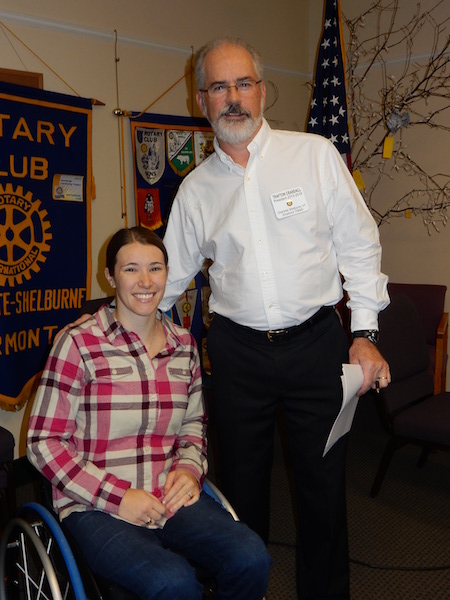Meeting of October 21, 2015
Trafton called “Good Morning Again!” and welcomed Linda Blair accompanying Ron and Barbara Gadhue’s daughter, Sophie.
HALLOWEEN PARADE. Dave Rice announced that the Halloween Parade was once again “under control” with only some minor details to iron out.
CAR RAFFLE. A pumpkin raffle was held and Sam Feitelberg’s daughter won the ticket. As of the 21st all tickets had been sold. A call for a parking director with a flashlight went out and volunteers for dishwashing and desserts.
FOOTBALL POOL. Alan Hathaway came in second; the winner (two time winner) was a gentleman from Florida.
Kelly and Zeke Davisson, Mary and Charlie Brush thanked the club for their contribution of $500.00 to the Kelly Brush Foundation. Chris Davis announced an Open House for demonstrations of biomass grass pellet technology at Meach Cove on Friday and Saturday from 9:00 to 12:00.

Fines were levied on a whole bunch of folks who grew a lot of tomatoes and apparently counted their tomatoes. Mike Clapp commented that these folks needed something else to do.
Upcoming dates to keep in mind (and since this is getting to folks after October 28th the note taker for that meeting can talk about William Grover from St. Michael’s College who spoke on the 28th :
November 04 Barry Finette, Think MD
November 11 Club Assembly
November 18 RYLA with Judy Christianson
November 25 THANKSGIVING
SPEAKER: Mark Gadhue from Northern Friends of Haiti spoke to the club about the work they are doing in the Bayonnois Valley. The overwhelming poverty gives rise to these statistics: 70% of the residents do not have clean water, it is a 2 ½ miles walk for water, farmers make about $1-2/a day, Haiti is the size of Vermont with a population of 10.5 million people and an estimated 98% of the forests have been cut down.
Mark’s “public charity, non-profit organization” has been working for the past three years on a variety of projects to partner with the local workforce building cisterns for the collection of water, sanitation projects, soil conservation and reforestration. Haiti used to be a tropical rain forest and the rural population has cut down much of the forest for fuel resulting in soil erosion.
.JPG)